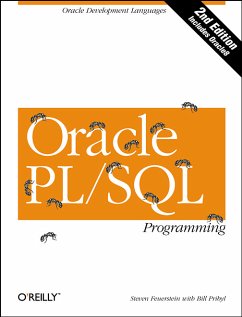Nicht lieferbar

Oracle PL/SQL Programming
Versandkostenfrei!
Nicht lieferbar
The first edition of Oracle PL/SQL Programming quickly became an indispensable reference for both novice and experienced PL/SQL developers. Packed with examples and recommendations, it helped everyone using PL/SQL (from the Oracle Forms developer to the database administrator) make the most of this powerful language.Oracle8 presents PL/SQL programmers with new challenges by increasing both the possibilities and complexities of the language. This new edition updates the original book for Oracle8, adding chapters describing the new PL/SQL object features (object types, collections, object views,...
The first edition of Oracle PL/SQL Programming quickly became an indispensable reference for both novice and experienced PL/SQL developers. Packed with examples and recommendations, it helped everyone using PL/SQL (from the Oracle Forms developer to the database administrator) make the most of this powerful language.
Oracle8 presents PL/SQL programmers with new challenges by increasing both the possibilities and complexities of the language. This new edition updates the original book for Oracle8, adding chapters describing the new PL/SQL object features (object types, collections, object views, and external procedures). The second edition also contains a much-requested chapter on tuning PL/SQL, as well as expanded discussions of debugging and tracing PL/SQL execution.
The book comes with a companion diskette containing the Companion Utilities Guide for Oracle PL/SQL Programming, an online tool developed by RevealNet, Inc. The online guide contains more than 100 file of source code and documentation prepared by the authors.
Even if you've already read the first edition of Oracle PL/SQL Programming, you'll find an enormous amount of new and revised information in this second edition and on its companion diskette. If you're new to PL/SQL, you'll soon find yourself on the road to mastery.
NOTE: To make room for the new material, some summaries and code from the first edition have been moved to the companion disk.
Oracle PL/SQL Programming is divided into seven parts:
Foreword
Preface
Part I: Programming in PL/SQL
1. Introduction to PL/SQL
2. PL/SQL Language Fundamentals
3. Effective Coding Style
Part II: PL/SQL Language Elements
4. Variables and Program Data
5. Conditional and Sequential Control
6. Database Interaction and Cursors
7. Loops
8. Exception Handlers
9. Records in PL/SQL
10.PL/SQL Tables
Part III: Built-in Functions and Packages
11. Character Functions
12. Date Functions
13. Numeric, LOB, and Miscellaneous Functions
14. Conversion Functions
Part IV: Modular Code
15. Procedures and Functions
16. Packages
17. Calling Stored PL/SQL Functions from SQL
Part V: PL/SQL Oracle8 Features
18. Object Types
19. Nested Tables and VARRAYs
20. Object Views
21. External Procedures
Part VI: Making PL/SQL Programs Work
22. Code Design Tips
23. Managing Code in the Database
24. Debugging PL/SQL
25. Tracing PL/SQL
26. Tuning PL/SQL
Part VII: Appendixes
A. What's on the Companion Disk?
B. Calling Stored Procedures from PL/SQL Version 1.1
C. Built-in Packages
Oracle8 presents PL/SQL programmers with new challenges by increasing both the possibilities and complexities of the language. This new edition updates the original book for Oracle8, adding chapters describing the new PL/SQL object features (object types, collections, object views, and external procedures). The second edition also contains a much-requested chapter on tuning PL/SQL, as well as expanded discussions of debugging and tracing PL/SQL execution.
The book comes with a companion diskette containing the Companion Utilities Guide for Oracle PL/SQL Programming, an online tool developed by RevealNet, Inc. The online guide contains more than 100 file of source code and documentation prepared by the authors.
Even if you've already read the first edition of Oracle PL/SQL Programming, you'll find an enormous amount of new and revised information in this second edition and on its companion diskette. If you're new to PL/SQL, you'll soon find yourself on the road to mastery.
NOTE: To make room for the new material, some summaries and code from the first edition have been moved to the companion disk.
Oracle PL/SQL Programming is divided into seven parts:
Foreword
Preface
Part I: Programming in PL/SQL
1. Introduction to PL/SQL
2. PL/SQL Language Fundamentals
3. Effective Coding Style
Part II: PL/SQL Language Elements
4. Variables and Program Data
5. Conditional and Sequential Control
6. Database Interaction and Cursors
7. Loops
8. Exception Handlers
9. Records in PL/SQL
10.PL/SQL Tables
Part III: Built-in Functions and Packages
11. Character Functions
12. Date Functions
13. Numeric, LOB, and Miscellaneous Functions
14. Conversion Functions
Part IV: Modular Code
15. Procedures and Functions
16. Packages
17. Calling Stored PL/SQL Functions from SQL
Part V: PL/SQL Oracle8 Features
18. Object Types
19. Nested Tables and VARRAYs
20. Object Views
21. External Procedures
Part VI: Making PL/SQL Programs Work
22. Code Design Tips
23. Managing Code in the Database
24. Debugging PL/SQL
25. Tracing PL/SQL
26. Tuning PL/SQL
Part VII: Appendixes
A. What's on the Companion Disk?
B. Calling Stored Procedures from PL/SQL Version 1.1
C. Built-in Packages



